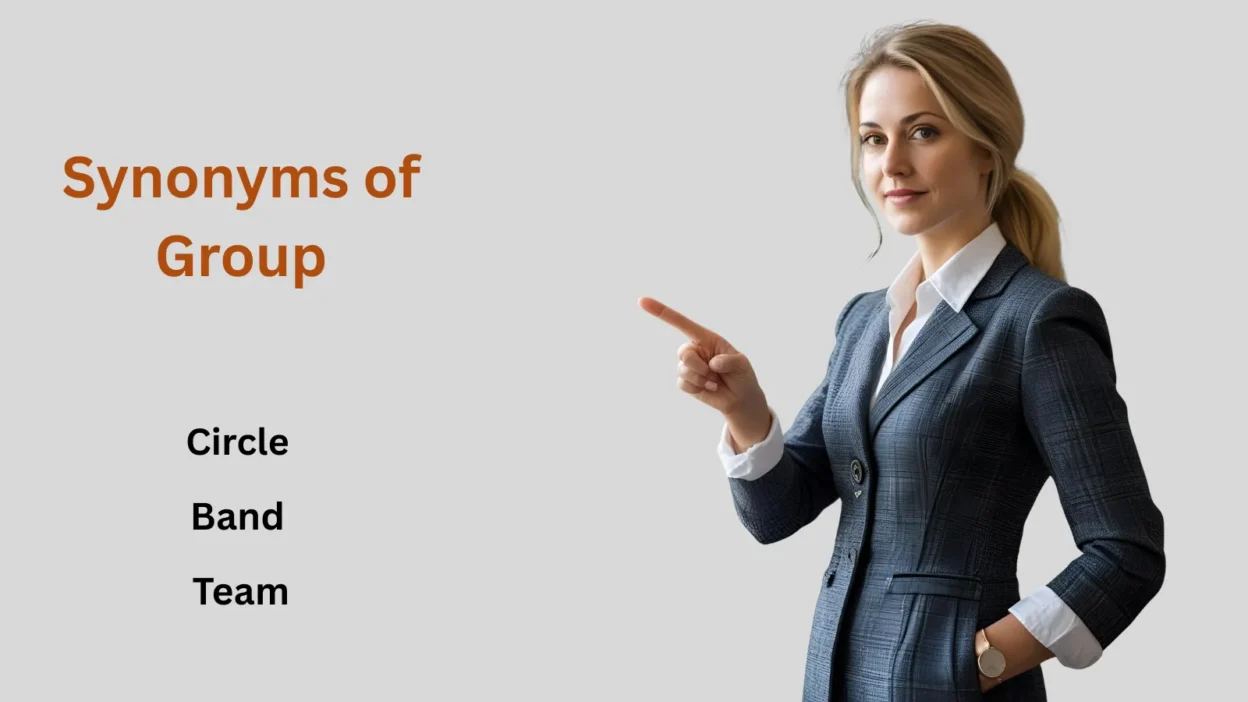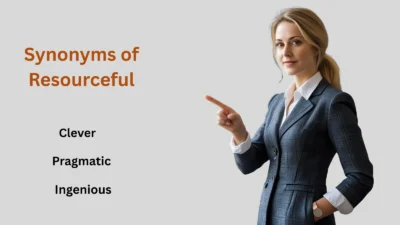Synonyms of group, such as team, cluster, circle, and assembly, describe collections of people, things, or ideas that are considered together. For example, “team” emphasizes people working toward a goal, while “cluster” highlights items gathered closely. Using the right synonym helps you show size, purpose, or connection clearly.
If you’re writing about social settings, organizations, or collections, choosing precise group synonyms makes your writing clear and easy to understand.
These synonyms of group not only improve your writing but also help readers grasp how people or things come together. From work teams to gatherings, the language of the group captures organization, connection, and unity.
What Does Group Mean?
At its core, a group refers to two or more people or things that are connected or considered as one. It often:
- Shows organization or structure
- Reflects shared purpose or identity
- Highlights collection or clustering
- Represents social, professional, or casual gatherings
It’s not just a number—it’s a unit, a connection, or a collection. Think of a group as people or things coming together in meaning or purpose.
Synonyms of Group: Meaning, Usage, and Examples
1. Team
- Meaning: A group working together toward a common goal, usually in sports or work.
- When to use: Emphasizes collaboration and shared effort.
- Example: The basketball team practiced all afternoon.
2. Band
- Meaning: A small group, often of musicians or people with a shared purpose.
- When to use: Informal, sometimes artistic or rebellious vibe.
- Example: A band of friends set out on a road trip.
3. Circle
- Meaning: A close, exclusive group often with shared interests or status.
- When to use: Emphasizes intimacy or social exclusivity.
- Example: She moved in the same social circle as the city’s artists.
4. Crowd
- Meaning: A large number of people gathered in one place.
- When to use: Neutral or slightly chaotic, physical presence emphasized.
- Example: The crowd cheered loudly at the concert.
5. Cluster
- Meaning: A small, close grouping of objects or people.
- When to use: Focuses on physical closeness.
- Example: A cluster of houses stood on the hillside.
6. Flock
- Meaning: Typically refers to birds, but also a group of people moving together.
- When to use: Casual, natural imagery, sometimes with a following or herd feel.
- Example: A flock of tourists followed the guide.
7. Pack
- Meaning: A group of animals or people, often with a shared goal or nature.
- When to use: Implies unity and sometimes aggression or protection.
- Example: The wolf pack hunted together at dawn.
8. Gang
- Meaning: A group of people, often informal and sometimes with a negative or rebellious tone.
- When to use: Informal, edgy, or youth culture contexts.
- Example: The kids formed a gang to play in the park.
9. Squad
- Meaning: A small, organized group with a purpose, often military or sports-related.
- When to use: Emphasizes efficiency and teamwork.
- Example: The rescue squad arrived quickly.
10. Class
- Meaning: A group of students learning together.
- When to use: Formal educational contexts.
- Example: The class listened attentively to the lecture.
11. Party
- Meaning: A group of people gathered for social or political purposes.
- When to use: Social events or political contexts.
- Example: The party of guests arrived at eight.
12. Assembly
- Meaning: A large group gathered for a formal meeting or event.
- When to use: Formal or official gatherings.
- Example: The school assembly started promptly at 9 a.m.
13. Company
- Meaning: A group of people, often in a business or military context.
- When to use: Formal or professional settings.
- Example: The company worked tirelessly on the new project.
14. Posse
- Meaning: An Informal group of friends or supporters, sometimes with a protective feel.
- When to use: Casual, often youthful or Western-themed.
- Example: He showed up with his posse at the party.
15. Congregation
- Meaning: A group gathered for religious worship.
- When to use: Religious or spiritual contexts.
- Example: The congregation sang hymns together.
16. Collective
- Meaning: A group with a shared interest or ownership.
- When to use: Emphasizes shared responsibility or creativity.
- Example: The artists formed a collective to share resources.
17. Council
- Meaning: A formal group assembled to discuss or govern.
- When to use: Official, political, or advisory groups.
- Example: The city council met to discuss new policies.
18. Teamwork
- Meaning: Emphasizes the act of working as a group, rather than the group itself.
- When to use: Focus on collaboration.
- Example: Teamwork made the project successful.
19. Troop
- Meaning: A group of soldiers or scouts.
- When to use: Military or youth organization contexts.
- Example: The troop marched through the forest.
20. Batch
- Meaning: A quantity of things or people grouped for processing.
- When to use: Focuses on grouping by time or production.
- Example: The factory produced a batch of toys.
21. Clique
- Meaning: A small, exclusive group often with a social hierarchy.
- When to use: Slightly negative, implies exclusivity or snobbery.
- Example: The popular kids formed a clique at school.
22. Network
- Meaning: A connected group, often for professional or social purposes.
- When to use: Emphasizes connections rather than physical gathering.
- Example: She built a strong network of industry contacts.
23. Set
- Meaning: A group with a shared interest or identity.
- When to use: Informal, sometimes social or hobby-related.
- Example: He hung out with the skateboarding set.
24. Mob
- Meaning: A large, disorderly group, often angry or unruly.
- When to use: Negative or chaotic situations.
- Example: A mob gathered outside the courthouse.
25. Colectivo
Meaning: A group of people seen as a whole, often linked by a common purpose or identity.
When to use: Use colectivo when you want to highlight unity, shared goals, or the idea of acting together as one. It can apply to social groups, organizations, or communities.
Example: El colectivo de artistas presentó una nueva exposición.
(Translation: The collective of artists presented a new exhibition.)
26. Guild
- Meaning: A group with a shared trade or craft, often historic.
- When to use: Professional or hobby groups, with a traditional feel.
- Example: The guild of blacksmiths met monthly.
27. Alliance
- Meaning: A group formed for mutual benefit or support.
- When to use: Political, military, or strategic contexts.
- Example: Several nations allied.
28. Ensemble
- Meaning: A group performing together, especially in music or theater.
- When to use: Artistic or performance settings.
- Example: The jazz ensemble played beautifully.
29. Bunch
- Meaning: A casual, informal grouping, often of people or objects.
- When to use: Friendly, relaxed tone.
- Example: A bunch of friends went hiking.
30. Gathering
- Meaning: A meeting of people, usually informal and social.
- When to use: Friendly or casual contexts.
- Example: The family gathering was warm and joyful.
How to Choose the Right Synonym
Picking the best synonym depends on:
- Size: Is it a few people (circle, clique) or many (crowd, mob)?
- Formality: Formal (assembly, council) or informal (bunch, posse)?
- Purpose: Working together (team, squad), socializing (gathering, party), or official (alliance, guild)?
- Emotional tone: Friendly (bunch, set), exclusive (clique, circle), or chaotic (mob, crowd)?
- Context: Professional, artistic, military, social, or religious?
For example:
- Writing about a sports event? Use team or squad.
- Describing a secretive group? Try circle or clique.
- Talking about a casual meetup? Use gathering or bunch.
- Discussing formal politics? Use council or assembly.
Conclusion
The word group is small, but it has many sides. It can mean friends at a café, a class of students, a band of musicians, or a set of things placed together. This shows why synonyms matter. Words like cluster, circle, crew, gathering, pack, or team let you share the same idea in new ways.
Using synonyms of group also keeps your writing fresh. Readers stay interested when the words change, but the meaning stays clear. It helps you avoid dull lines and makes your ideas stand out.
So, think of synonyms as tools. Pick the one that fits the moment. A story may need a “circle of friends.” A report may need a “set of data.” A poem may need a “band of stars.” With the right word, you can paint a picture that feels real and strong.



